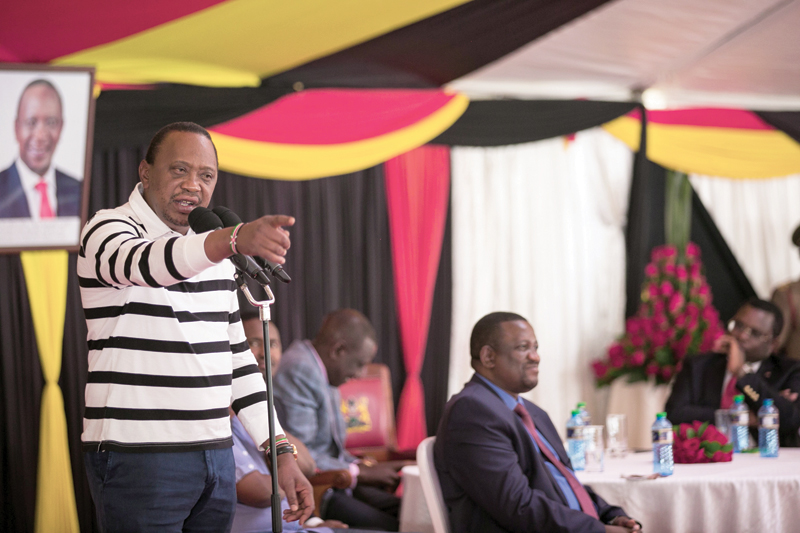

Nairobi: Kenyan President Uhuru Kenyatta on Saturday lashed out at the judiciary for overturning his re-election, and refused opposition demands to replace the tarnished polls commission.
While repeating his assertion that he respected the Supreme Court decision, Kenyatta set the stage for a bitter and tense re-run of the presidential election which must take place before October 31.
Chief Justice David Maraga on Friday declared Kenyatta’s victory in August 8 polls “invalid, null and void”, pointing to widespread irregularities in the electronic transmission of vote results.“Every time we do something a judge comes out and places an injunction. It can’t go on like this... there is a problem and we must fix it,” said Kenyatta.
“I think those robes they wear make them think that they are more clever than the rest of us Kenyans,” Kenyatta said of the Supreme Court judges, taking specific aim at Maraga.
“Maraga thinks he can overturn the will of the people. We shall show you ... that the will of the people cannot be overturned by a few people.”
On Friday he slammed the judges as “crooks”— after weeks of urging the opposition to turn to the courts and “use whatever legal mechanisms that have been created via our wonderful constitution to express their dissatisfaction.” Law Society of Kenya president Isaac Okera condemned his remarks as “wholly inappropriate” and “ominous”.
Meanwhile the fate of the electoral commission (IEBC) was shaping up as the next battle between Kenyatta and Odinga, heirs to a dynastic rivalry dating back to independence in 1963.
Maraga said the IEBC had failed to properly conduct the presidential election, and that there had been “irregularities and illegalities”.
Odinga demanded the discredited commission be replaced, and IEBC chairman Wafula Chebukati said there would be some “internal changes” but refused to resign. The previous commission — tarnished by a corruption scandal and poor handling of 2013 polls — was forced to stand down in October after widespread protests. The new commission, named in January had only seven months to organise the polls.
Kenyatta dismissed the option of a change at the IEBC, stating “we don’t have time for any more reforms.”
He accused Odinga of seeking to derail the election “to join the government through the back door” by forcing a coalition government.
“Let IEBC do their job, let them declare the date (of a new election) and Raila let us meet at the ballot.”
It is the first time a presidential election result has been overturned in Africa. Similar court rulings have been seen in Austria, Haiti, Ukraine, Serbia and the Maldives.
Kenya’s press hailed the ruling as a hard-fought victory for the rule of law, and sign of a maturing democracy.
An editorial in the Nation newspaper said the ruling “signalled the end of the era of impunity that has painfully assailed this country for too long.”
“Kenyans have struggled for decades to institutionalise the rule of law. We have fought, shed blood, lost lives and property in search of constitutional order,” the paper said.
The press also raised prickly questions about the weeks to come. “How (the IEBC) will conduct the next elections in the next 60 days in unimaginable,” said the Nation.
“Already the NASA (opposition) leadership has declared war on the commission and with or without that, its credibility has been severely dented and the public has lost confidence in it.”
The Standard said the IEBC must “clean up house”.
“What Kenya needs most now is an election conducted in a legal, fair and transparent manner.”
The opposition National Super Alliance (NASA) cried foul after the August 8 poll over alleged hacking of the electronic system transmitting results from over 40,000 polling stations to the national tallying centre. Observers have warned that the new election could bring even more tension to a country where politics is largely divided along tribal lines. — AFP
Oman Observer is now on the WhatsApp channel. Click here



